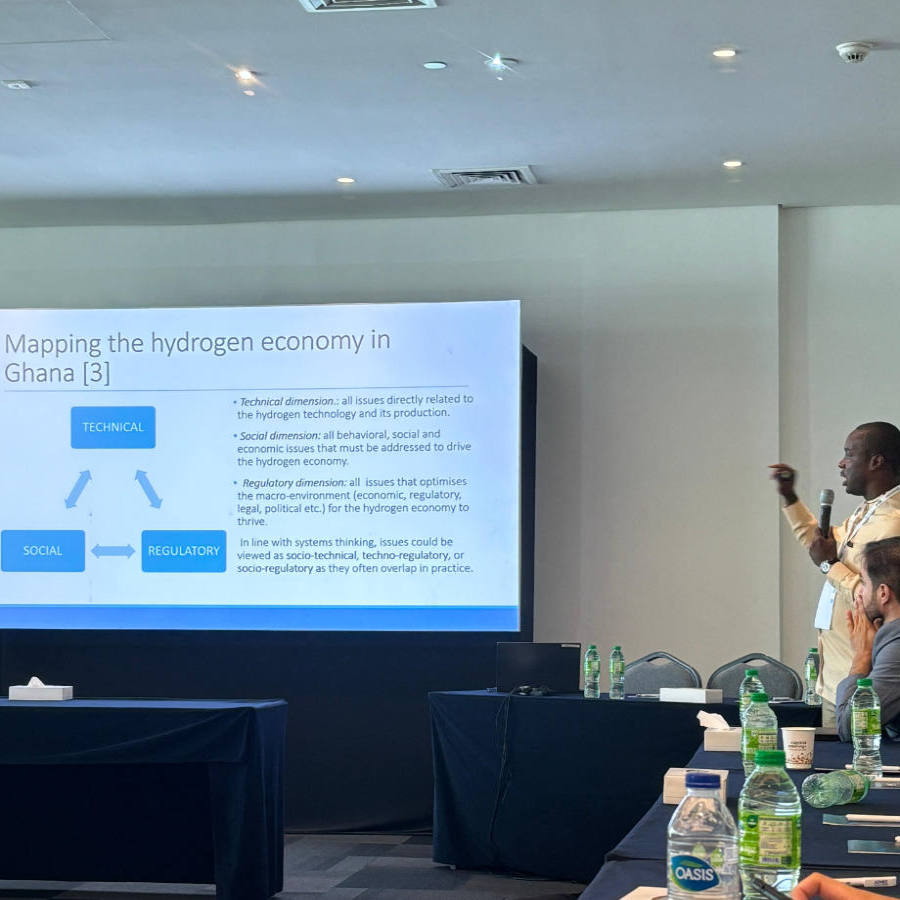About Us


Overview
Founded in 2024, the Ghana Hydrogen Initiative is an independent, non-profit think tank dedicated to disseminating knowledge about hydrogen use and benefits in the Ghanaian economic context. Given the global interest in clean hydrogen towards Net zero at 2050, the Ghana Hydrogen Initiative will serve as platform to facilitate research and dialogue on using hydrogen and transitioning to a hydrogen economy with special focus on Ghana’s context.
In Ghana, the National Energy Transition Plan envisions promoting the use of hydrogen to diversify the fuel mix in Ghana. A key scenario in this plan shows that by 2070 all road and rail mobilities should be electricity and hydrogen fuelled.
The Ministry of Energy, Ghana envisions that hydrogen will play a key role in Ghana’s energy sector especially through the transport sector by 2050. This scenario will require that Ghana’s macro policy and economic environment is optismised for the adaptation of hydrogen technologies.
The Ghana Hydrogen Initiative seeks to serve as the foremost platform to leverage and mainstream collective expertise of researchers, industry officials, scientists through research and fact-based policy proposals to inform Ghana’s transition to a hydrogen economy.
Vision
To drive research and policy dialogue towards Ghana’s Hydrogen economy
Mission
To provide a platform for robust research and policy discussion on use of hydrogen in a clean energy framework and towards Ghana’s economic transformation and growth
Why Hydrogen?
Hydrogen is the lightest, most basic, and most plentiful of all chemical elements in the universe. However, it occurs only in combination with other elements, primarily with oxygen in water and with carbon, nitrogen and oxygen in living materials and fossil fuels. Although it is not a primary source of energy, it becomes an attractive energy carrier when split from these other elements by using a source of energy. Further, a characteristic worth noting, It is a clean and versatile energy carrier that plays a critical role in the transition to sustainable energy systems.


Why Hydrogen?
Hydrogen is the lightest, most basic, and most plentiful of all chemical elements in the universe. However, it occurs only in combination with other elements, primarily with oxygen in water and with carbon, nitrogen and oxygen in living materials and fossil fuels. Although it is not a primary source of energy, it becomes an attractive energy carrier when split from these other elements by using a source of energy. Further, a characteristic worth noting, It is a clean and versatile energy carrier that plays a critical role in the transition to sustainable energy systems.
A Hydrogen Economy
A hydrogen economy is essential as it addresses many of the urgent issues we face today, such as climate change, energy security, and economic sustainability. Moving towards a hydrogen-powered energy system provides numerous significant advantages:
Combatting Climate Change
Decarbonization of Energy Systems:
- Hydrogen can replace fossil fuels in energy production, transportation, and industry, significantly reducing greenhouse gas emissions.
- When produced using renewable energy (green hydrogen), it is a zero-emission fuel.
Hard-to-Abate Sectors:
- Hydrogen enables decarbonization in sectors like steelmaking, cement production, and aviation, which are challenging to electrify.
Enhancing Energy Security
Diversifying Energy Sources:
- Hydrogen can be produced locally from renewable resources, reducing dependence on imported fossil fuels.
Energy Storage:
- Acts as a medium to store excess energy from intermittent renewable sources (solar and wind), ensuring a stable and resilient energy supply.
Energy Carrier:
- Can transport energy across regions, enabling global energy trade and reducing reliance on geopolitically sensitive resources.
Supporting Economic Growth
Job Creation:
- A hydrogen economy creates several jobs in R&D, manufacturing, infrastructure development, and hydrogen production.
Green Investments:
- Attracts capital in clean technology sectors, fostering economic growth and innovation.
Revitalizing Industries:
- Offers opportunities to modernize traditional industries like petrochemicals and steel by integrating clean hydrogen.
Enabling Renewable Energy Integration
Stabilizing Renewable Grids:
- Hydrogen can store surplus electricity generated by renewables and supply it during periods of low generation.
Seasonal Energy Storage:
- Provides a long-term storage solution, addressing seasonal variability in renewable energy production
Addressing Air Pollution and Public Health
Cleaner Air:
- Hydrogen combustion or use in fuel cells emits only water vapor, reducing air pollution from transportation and industry.
Public Health Benefits:
- Lowering emissions of pollutants like nitrogen oxides (NOx) and particulates improves respiratory health and reduces healthcare costs.
Global Energy Transition and Collaboration
Achieving Net-Zero Goals:
- Many countries view hydrogen as a cornerstone for meeting their net-zero emissions targets.
International Trade:
- Hydrogen opens new opportunities for energy-exporting countries to trade clean fuels, creating a global hydrogen economy.
Energy Equity:
- Hydrogen production can democratize energy access by enabling regions with abundant renewable resources to become energy producers.
Promoting Innovation and Technological Leadership
Driving R&D:
- Encourages innovation in fields like electrolyzers, fuel cells, and hydrogen storage technologies.
Leadership in Clean Energy:
- Early adoption of hydrogen positions countries and companies as leaders in the global clean energy transition.
Challenges Addressed in a Hydrogen Economy
A hydrogen economy is essential to attaining a low-carbon, sustainable future because it promotes a more secure and robust energy system, a cleaner environment, and stronger economies. By adopting hydrogen technologies, societies can address climate and energy concerns while opening new opportunities for cooperation and progress.
Challenges
Energy Demand Growth:
- Meets growing energy demand without increasing carbon emissions.
Electrification Gaps:
- Provides a solution for applications where direct electrification is impractical or inefficient.
Global Warming:
- Helps limit global temperature rise to 1.5°C by reducing CO₂ emissions across sectors.
Landscape of Ghana’s hydrogen economy
The Gap
In Ghana, a very nascent and unstructured hydrogen economy exists. However, the economic impact of transitioning to a hydrogen energy system in Ghana can be huge. The Ghanaian economy stands to reap several direct, indirect and induced benefits (jobs and income) through a multiplier and cross sectoral effects.
The commercial potential for green hydrogen production in Ghana is not in doubt. An assessment Ghana’s potential for green hydrogen production based on wind and solar energy exists. A lower middle-income country, Ghana has also declared its intention to pursue a Nuclear Power Programme for peaceful purpose which provides cogeneration opportunities including hydrogen production. To structure a well-functioning hydrogen economy in Ghana, effective and timely hydrogen specific policies and accompanying mechanisms will be required.
The Strategic solution
Ghana’s hydrogen economy will require structure and strategic direction to formalise mainstream and optimise successfully. The initiative will create the unified platform to streamline conversation around hydrogen development and use in Ghana. It will enable diverse stakeholders speak to each other on this important energy carrier which is gaining prominence in the global economy, and understand associated technologies, infrastructure and implications. It will offer a unique platform for engagements of Ghana hydrogen ecosystem.
